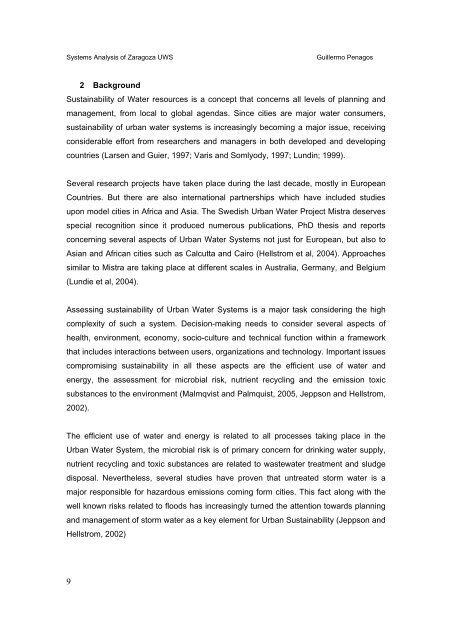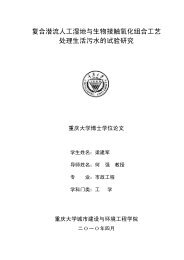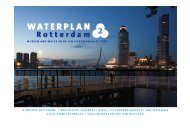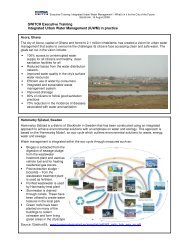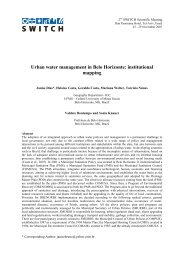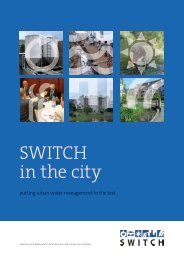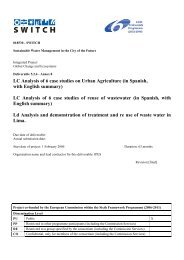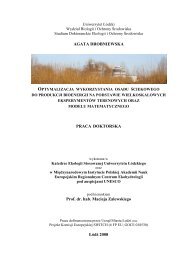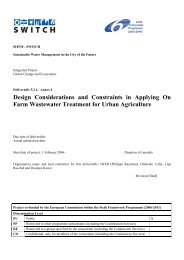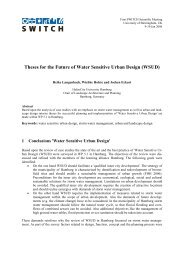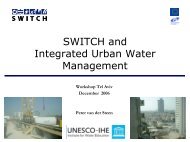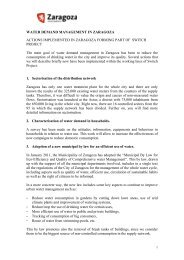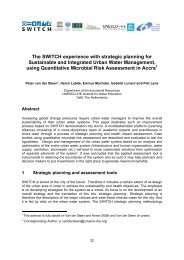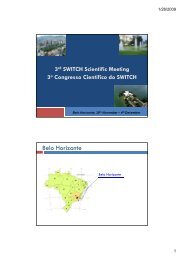Systems Analysis of Zaragoza Urban Water - SWITCH - Managing ...
Systems Analysis of Zaragoza Urban Water - SWITCH - Managing ...
Systems Analysis of Zaragoza Urban Water - SWITCH - Managing ...
Create successful ePaper yourself
Turn your PDF publications into a flip-book with our unique Google optimized e-Paper software.
<strong>Systems</strong> <strong>Analysis</strong> <strong>of</strong> <strong>Zaragoza</strong> UWS<br />
Guillermo Penagos<br />
2 Background<br />
Sustainability <strong>of</strong> <strong>Water</strong> resources is a concept that concerns all levels <strong>of</strong> planning and<br />
management, from local to global agendas. Since cities are major water consumers,<br />
sustainability <strong>of</strong> urban water systems is increasingly becoming a major issue, receiving<br />
considerable effort from researchers and managers in both developed and developing<br />
countries (Larsen and Guier, 1997; Varis and Somlyody, 1997; Lundin; 1999).<br />
Several research projects have taken place during the last decade, mostly in European<br />
Countries. But there are also international partnerships which have included studies<br />
upon model cities in Africa and Asia. The Swedish <strong>Urban</strong> <strong>Water</strong> Project Mistra deserves<br />
special recognition since it produced numerous publications, PhD thesis and reports<br />
concerning several aspects <strong>of</strong> <strong>Urban</strong> <strong>Water</strong> <strong>Systems</strong> not just for European, but also to<br />
Asian and African cities such as Calcutta and Cairo (Hellstrom et al, 2004). Approaches<br />
similar to Mistra are taking place at different scales in Australia, Germany, and Belgium<br />
(Lundie et al, 2004).<br />
Assessing sustainability <strong>of</strong> <strong>Urban</strong> <strong>Water</strong> <strong>Systems</strong> is a major task considering the high<br />
complexity <strong>of</strong> such a system. Decision-making needs to consider several aspects <strong>of</strong><br />
health, environment, economy, socio-culture and technical function within a framework<br />
that includes interactions between users, organizations and technology. Important issues<br />
compromising sustainability in all these aspects are the efficient use <strong>of</strong> water and<br />
energy, the assessment for microbial risk, nutrient recycling and the emission toxic<br />
substances to the environment (Malmqvist and Palmquist, 2005, Jeppson and Hellstrom,<br />
2002).<br />
The efficient use <strong>of</strong> water and energy is related to all processes taking place in the<br />
<strong>Urban</strong> <strong>Water</strong> System, the microbial risk is <strong>of</strong> primary concern for drinking water supply,<br />
nutrient recycling and toxic substances are related to wastewater treatment and sludge<br />
disposal. Nevertheless, several studies have proven that untreated storm water is a<br />
major responsible for hazardous emissions coming form cities. This fact along with the<br />
well known risks related to floods has increasingly turned the attention towards planning<br />
and management <strong>of</strong> storm water as a key element for <strong>Urban</strong> Sustainability (Jeppson and<br />
Hellstrom, 2002)<br />
9


